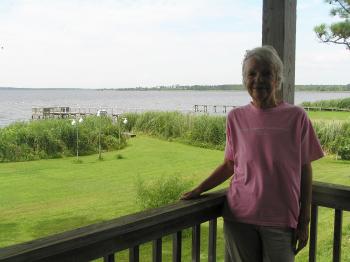Sandy Semans Ross

1997 North Carolina Fisheries Reform Act
The Fisheries Reform Act is the most significant fisheries legislation in NC history.
In 1994, the North Carolina General Assembly approved a moratorium on the sale of new commercial fishing licenses and established the 19-member Fisheries Moratorium Steering Committee to oversee a study of the state's entire coastal fisheries management process and to recommend changes to improve that process. The Moratorium Steering Committee included legislators, fisheries managers, scientists, commercial fishermen, and recreational fishermen. The committee commissioned six research studies and reviewed a broad range of issues, including fishing licenses, fishing gear, habitat protection, agency organization, and law enforcement. The committee issued a draft report in the late summer of 1996, held 19 public meetings across the state, and adopted a final report in October 1996 that formed the basis for the Fisheries Reform Act. Governor James B. Hunt signed the Act into law on August 14, 1997.
The 1997 North Carolina Fisheries Reform Act: An Oral History Perspective was made possible by the North Carolina Sea Grant Community Collaborative Research Grant Program.
Mary Williford
Sandy Semans Ross is a retired newspaper editor and freelance writer who has a deep connection with the coastal communities and seafood industry. Born in a coal mining town in West Virginia, Ross moved to coastal communities due to her father's Navy service, where she developed a love for seafood. Ross's professional career includes working as a newspaper editor and doing freelance work for various publications. She is also the Executive Director of Outer Banks Catch, an organization dedicated to promoting locally caught seafood and supporting the local fishing industry.
Scope and Content Note
This interview with Sandy Semans Ross, conducted by Susan West on June 17, 2016, provides an in-depth look at Ross's early relationship with seafood, her work history, and her role as the Executive Director of Outer Banks Catch. The interview also delves into the mission of the Outer Banks Catch organization and Ross's role in fact-checking fisheries-related press releases. The discussion further explores the Fisheries Reform Act, including key players in the process, gaps in the legislation, and changes Ross would like to see to improve the legislation [3]. Ross also discusses the necessity of developing an appeals process, her issue with the perceived recreational-versus-commercial paradigm, and the necessity of "good" science in fisheries management. The interview also covers the state's responsibility to regulate and monitor public trust resources, the role of healthy coastal economies and commercial fishing, and the influence of special interest groups and the book Tragedy of the Commons during the Fisheries Reform Act process. Ross also shares her experiences with the Moratorium Steering Committee meetings, environmental, habitat, and water quality concerns expressed by fishermen, and the lack of effective date for the Coastal Habitat Protection Plan. The interview also touches on the fish kills of the 1990s, the creation of the Clean Water Trust Fund, and the role of key players like Bob Lucas and B.J. Copeland in the Fisheries Reform Act process.
Please Note: The oral histories in this collection are protected by copyright and have been created for educational, research and personal use as described by the Fair Use Doctrine in the U.S. Copyright law. Please reach out Voices@noaa.gov to let us know how these interviews are being used in your research, project, exhibit, etc. The Voices staff can help provide other useful resources related to your inquiry.
The NOAA mission is to understand and predict changes in climate, weather, oceans, and coasts, to share that knowledge and information with others, and to conserve and manage coastal and marine ecosystems and resources. The Voices Oral History Archives offers public access to a wide range of accounts, including historical materials that are products of their particular times, and may contain offensive language or negative stereotypes.
Voices Oral History Archives does not verify the accuracy of materials submitted to us. The opinions expressed in the interviews are those of the interviewee only. The interviews here have been made available to the public only after the interviewer has confirmed that they have obtained consent.
